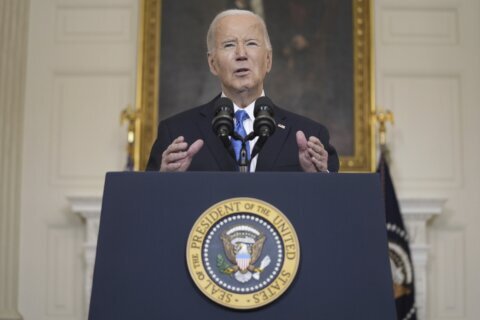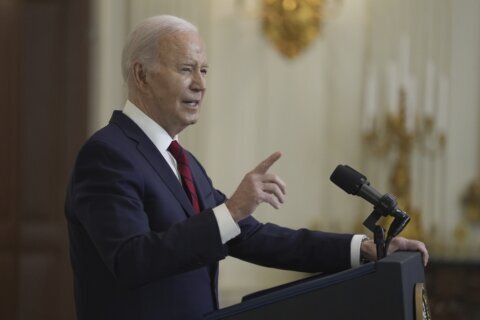Excerpts from recent editorials in the United States and abroad:
July 30
The Washington Post on U.S. accepting Ukrainian immigrants
The United States has now met President Biden’s goal, announced in March, to legally admit “up to” 100,000 Ukrainians fleeing Vladimir Putin’s blood-soaked invasion. That admirable achievement shouldn’t mark the end of this country’s commitment to sharing the burden of the ongoing humanitarian nightmare in Europe. The administration has the means and programs in place to retain an open door for Ukrainians forced from their homes. It should prepare for another 100,000.
That target might seem ambitious. In fact, many of the United States’ closest allies have shouldered a greater refugee burden since the war started in February, either in absolute numbers or, in even more instances, on a per capita basis. Britain, Canada, Germany, Poland, the Czech Republic, Slovakia, Italy, France, Bulgaria, Spain, Portugal and the Netherlands have all welcomed large populations of Ukrainian migrants. Even the smallest NATO members — Lithuania, Latvia and Estonia, each with a population of fewer than 3 million — have accepted tens of thousands.
The flood of Ukrainians seeking refuge is a calamity inflicted on the world by Mr. Putin. He regards them not as suffering individuals but as leverage to force the West to cry uncle and urge Ukraine to sue for peace. To the Kremlin’s strongman, the refugees are of a piece with the flow of Russian gas and oil, which he seems likely to impede as a way to break Europe’s unity and resolve. Democracies, he thinks, are fundamentally weak.
That’s why Mr. Biden’s leadership on Ukrainian migrants is critical. Continuing to admit Ukrainian refugees is important not only to reaffirm the historic U.S. role as a beacon to the world’s most desperate people. It also offers another means, along with military and economic assistance, of showing Mr. Putin that democracies can face down authoritarian brutality.
The challenge of sustaining that commitment should not be underestimated. As of early July, the United Nations estimated that more than 5.6 million Ukrainian refugees had been recorded across Europe. Millions more are displaced inside Ukraine, a devastating toll. Depending on the course of the war — unpredictable but still likely to last many more months, at a minimum — the migrant outflow may continue or accelerate. As Ukrainian cities are captured or rendered uninhabitable by Russian attacks, more migrants could seek refuge farther afield, in Britain, Canada and the United States
As in this country, Canada and Britain have established sponsorship programs, among other methods of entry, under which Ukrainians are resettled in homes. Under the U.S. version of that arrangement, called Uniting for Ukraine, roughly 30,000 migrants have been resettled, and another 30,000 or so have been approved for travel. Applications from would-be sponsors continue to roll in at a brisk pace; many are Ukrainian Americans around New York and Chicago. In Britain and Canada, too, tens of thousands more migrants are expected in the coming months.
U.S. resolve must continue unabated, and it should also grow to include refugees who lack sponsors. How the Biden administration meets this test will be an ongoing barometer of its commitment to American values and traditions.
ONLINE: https://www.washingtonpost.com/opinions/2022/07/30/us-has-admitted-100000-ukrainian-migrants-it-must-keep-going/
___
July 29
The New York Times on the U.S. economic sanctions against Russia
The United States and its allies are leaning heavily on economic sanctions to punish Russia for its invasion of Ukraine. But a key element in that strategy, restrictions on Russian oil exports, mostly appears to be causing pain for ordinary people in other countries. European nations, in particular, are causing considerable damage to their own economies without reducing Russia’s oil revenue.
Nations seeking to help Ukraine are aiming at the wrong target. They have focused on reducing Russia’s energy exports instead of reducing Russia’s earnings from energy exports. Russia is exporting less oil but, in a perverse twist, it is earning more money, according to the Center for Research on Energy and Clean Air, based in Finland. The sanctions have raised prices, more than offsetting the decline in exports. In May 2022, Russia earned 883 million euros per day from oil exports, up from 633 million euros per day in May 2021.
The situation is about to take a turn for the worse. New sanctions that the European Union and Britain have agreed to impose on Russia by year’s end are likely to drive oil prices even higher. Some analysts warn that the price for a barrel of oil could exceed $200, well above the spike in the early weeks of the war, when oil prices topped out around $124. That could easily push Western economies into a recession.
The Biden administration has a plan that could avert this crisis. It would establish a buyer’s cartel — an agreement among Russia’s customers to put a price ceiling on Russian oil. That ceiling would be significantly lower than the current market price, sharply reducing the role of Western consumers in funding the Russian military. But the price would still allow Russia to make some profit, so that it has an incentive to export its oil to members of the cartel. Some of the key participants in the plan, including the United States, have banned the importation of Russian oil, but other nations that America hopes to enlist, notably India, continue to import large volumes of Russian oil.
It is an audacious and untested idea. It also appears to be the best available option. If it works, it could deprive Russia of revenue without devastating the economies of nations that are trying to support Ukraine.
Constructing a cartel is not easy. The United States has already secured the agreement in principle of the other members of the Group of 7, a coordinating body for the major democratic economic powers. American officials, including Treasury Secretary Janet Yellen, are working with their counterparts to hammer out the details. The buyers’ cartel would be strengthened if other big buyers of Russian oil, notably India and China, could be persuaded to participate. That seems unlikely. But U.S. officials argue the cartel could still increase pressure on Russia by allowing nations that are not participating to extract larger discounts, too.
Maintaining a cartel is also hard. Because the participants can benefit by cheating on the price ceiling, policing a price-fixing agreement is notoriously difficult. But in this case, there may be a plausible enforcement mechanism. A key piece of the new sanctions by the European Union and Britain is a ban on insuring tankers that carry Russian oil. Shippers need insurance to navigate canals and to enter harbors. European companies dominate the market; in April and May, 68 percent of Russian oil exports traveled on tankers insured by European businesses. That measure could be modified to ban insurance for tankers with oil purchased at a price above the cartel’s ceiling.
The Russian government has sought to forestall the plan by warning that it would refuse to go along with it. “As far as I understand, we won’t be supplying oil to those countries which would impose such a cap, and our oil, oil products will be redirected to the countries which are ready to cooperate with us,” Elvira Nabiullina, the governor of Russia’s central bank, said at a news conference last week. Analysts, however, say that if a cartel is established, Russia’s real choice would be between accepting its terms and leaving a large share of current oil production in the ground.
Perhaps the most compelling objection is that the price ceiling plan removes the stigma on Russian oil. Ukrainian leaders argue that the best way to aid their cause is to abstain from spending any money on Russian energy; a cartel would normalize those purchases.
The world would surely be in a better position today if it had not developed a dependence on Russian energy. That is a tale with its own lessons, including the urgency of transitioning to sustainable energy that can be generated closer to home and the need to align trade policy more closely with other national priorities. The only lasting way to reduce Russia’s economic power as an energy exporter is to reduce demand for its energy.
But those shifts will take time. A buyer’s cartel is a temporary expedient. After decades of complacent dependence on Russia, European nations are scrambling to adopt new plans to reduce energy use and expand sustainable wind and solar power. The war in Ukraine ought to catalyze similar investments by the United States, which is a net energy exporter but remains dependent on fossil fuel imports.
In the meantime, Ukraine needs the sustained support of its allies in what may be a prolonged struggle. It is counterproductive to impose unnecessary pain.
ONLINE: https://www.nytimes.com/2022/07/29/opinion/russia-oil-sanctions-biden.html
___
Aug. 1
The Los Angeles Times on Biden’s program to fund 100,000 new police officers in the U.S.
COVID-19 scuttled President Biden’s trip last month to Wilkes-Barre, Pennsylvania, where he planned to unveil a $37-billion public safety program centered on federal funding for 100,000 new police officers in local law enforcement departments around the nation.
The aim was to respond to anxiety over crime increases in some cities and to make clear to voters, in advance of November’s midterm elections, that he and congressional Democrats do not fit the soft-on-crime caricature painted by former President Trump and other Republican leaders.
Biden’s “Safer America Plan” moved forward in fits and starts before being formally presented Monday.
The previous Tuesday, Trump made his own crime-fighting speech, in which he praised China’s brutal criminal justice system, promoted sham trials and summary executions for suspected drug dealers, promised a return to the random police stops and searches (practices struck down by courts as unconstitutional) and called for the armed federal takeover of cities run by Democrats — in the name of public safety.
And he called for hiring “tens of thousands of police officers.”
The nation’s response to crime and its attitude toward police continue to be central to the political debate. Biden knows that many Democrats reject the “defund the police” rhetoric coming from the progressive left, and he is fighting hard to be seen as the true supporter of law enforcement. He has rightly called out Trump’s disregard for Capitol Police officers injured during the Jan. 6 insurrection. It’s Trump who is the anti-police president, Biden said. “You can’t be pro-insurrection and pro-cop,” he said.
That’s true — except for the nagging reminder that police were on both sides of the barricades that day. The Capitol Police and D.C. Metropolitan Police officers who courageously protected members of Congress faced off against a MAGA mob that included a small but not-insignificant number of off-duty law enforcement officers.
To his credit, Biden earlier this year signed an executive order that puts in place many of the higher police performance standards embodied in the George Floyd Justice in Policing Act, a modest but important package of reforms that was passed twice by the House but died in the Senate. It bans chokeholds and carotid restraints in most cases, restricts no-knock entries, creates a database of police misconduct, promotes officer mental health and creates new guidelines for hiring and supervising police, among other things. That’s in marked contrast to the Trump approach, which he reminded his audience last week is to “leave our police alone.”
Yet the reach of those reforms is short — many apply only to federal officers and agencies, and they can be overridden by legislation or a subsequent order from the next president. Police culture is largely unchanged from the era before Floyd’s murder by Minneapolis Police Officer Derek Chauvin on May 25, 2020. So when we hire another 100,000 police officers, we may well be merely expanding the scope of a problem we have not yet begun to solve.
Remember that as a senator, Biden was the principal author of the 1994 crime bill, a response to violence far worse than what we’re facing today, although by the time of its passage the crime wave was already abating. A key component of the bill was funding to hire 100,000 police officers.
Biden later called the bill a mistake, although not the officer-hiring component.
The officers were hired, and they were at first welcomed — but many of the neighborhoods they promised to protect were soon harmed by excessive force, surveillance and humiliation from the policing expansion. Little investment was made in improving living, working, education and health conditions in those same neighborhoods. It was an opportunity lost.
We don’t need 100,000 more police to do the same thing all over again. Nor do we need 100,000 Derek Chauvins or 100,000 more cops lurking hesitantly outside classrooms for more than an hour while children die inside. We don’t need more police who refuse to be vaccinated against a deadly communicable disease that has been one of history’s largest and most sweeping police killer, or more sheriffs who falsely assert that they are the final arbiters of the Constitution, or who flout subpoenas and investigations as L.A. County Sheriff Alex Villanueva does. We don’t need more officers in growing, publicly funded police PR departments, whose job is to justify every police action rather than to release factual public information about police incidents and actions.
Yet we most certainly need police. Even among the “defund” and “abolition” movements, there are those who quietly acknowledge that armed law enforcement officers play an important role in public safety.
In fact, responsible policing is the keystone of public safety.
But like any armed force, police must be directed, restricted and corrected by attentive civilian leaders acting within a democratic system and in accordance with the law and the Constitution. Policing is an important servant but an oppressive master.
Biden has made important gestures and has taken substantive first steps toward more police accountability and smarter, more appropriate alternatives to policing where appropriate, but far more is needed. Those should be the nation’s priorities. Funding for 100,000 police officers may be a smart political calculation. But it’s the wrong move for public safety.
ONLINE: https://www.latimes.com/opinion/story/2022-08-01/biden-police-expansion-mistake
___
Aug. 1
China Daily on U.S. inflation
Following its interest rate hikes of 25 basis points in March, 50 in May and 75 in June, the United States Federal Reserve announced another rise of 75 basis points last week.
According to the Fed, the median forecast for its interest rate at the end of this year was 3.4%, which is now 2.25-2.5%. That means there are still 90-100 basis points or so to spare. The Fed has also started the process of shrinking its balance sheet.
But whether the moves can resolve the highest inflation since the 1980s in the country remains uncertain as it is caused by factors that are beyond the Fed’s reach.
What is certain is the negative spillover effects caused by the Fed’s moves are building up for the rest of the world. That means the U.S. is taking advantage of the dollar’s status as international currency to diffuse its inflation worldwide, and put headstalls on the world to pull the recovery of the U.S. economy.
The moves will prompt the outflow of capital from other countries, particularly the emerging market economies as well as those with high debts and leverage levels, sapping the foundation of their already unstable recovery.
Although the U.S. has registered negative GDP growth for two consecutive quarters, the performance of the labor market is relatively strong, with 2.7 million new jobs created in the first half of this year.
That the U.S. economy has not yet entered a technical recession means the Fed’s interest rate hike may slow down, and the schedule of its balance sheet shrinking may also be adjusted according to the reaction of the domestic market.
But that only serves to address the superficial symptoms of the inflation. The U.S. requires corresponding deregulation in the labor market to prevent the emergence of the “wage-price spiral” inflation mechanism. And it should also provide institutional relief on the energy shortage that has caused this round of inflation, which, however, is almost impossible if the Joe Biden administration continues to pour oil on the flames of the Ukraine crisis and heightens its containment policies targeting China at the cost of the global supply chains.
Washington should realize that its monetary policy cannot resolve the root cause of the inflation in the U.S., which is not only the result of its excessive issuance of currency but also the geopolitical tensions and its decoupling efforts targeting China.
It should adopt a new geopolitical position, ensure the stability of the global supply chains, create favorable conditions for countries to strengthen a new round of globalization and trade liberalization negotiations so as to prevent decoupling and other anti-globalization moves.
At the same time, other countries should further strengthen their respective inflation pegging mechanism in macro policies to stabilize global expectations, strengthen the coordination of their macroeconomic policies and deepen their structural reform. It is particularly important to give full play to the potential capacity of China’s manufacturing industry to reduce costs in terms of supply.
ONLINE: https://global.chinadaily.com.cn/a/202208/01/WS62e7d959a310fd2b29e6f978.html
___
Aug. 2
The Wall Street Journal on the Schumer-Manchin tax bill
Progressives want Joe Biden to unleash what they call “beast mode” executive power, and the Schumer-Manchin tax bill supplies the cash to turn the Internal Revenue Service into Wolverine.
The pact between Sen. Joe Manchin and Majority Leader Chuck Schumer includes $80 billion in new funding for the tax man. Democrats claim this “investment” will yield more than $200 billion in revenue. That estimate is highly speculative, but if it’s anywhere close to right IRS auditors will soon be coming after tens of millions of Americans.
The $80 billion is more than six times the current annual IRS budget of $12.6 billion. The money will be ladled out over nine years and comes with few strings attached. The main Democratic command is for the tax agency to bring the hammer down on taxpayers.
The bill earmarks $45.6 billion for “enforcement,” including “litigation,” “criminal investigations,” “investigative technology,” “digital asset monitoring” and a new fleet of tax-collector cars. The result will be far more audits, civil suits and criminal referrals.
The main targets will by necessity be the middle- and upper-middle class because that’s where the money is. The Joint Committee on Taxation, Congress’s official tax scorekeeper, says that from 78% to 90% of the money raised from under-reported income would likely come from those making less than $200,000 a year. Only 4% to 9% would come from those making more than $500,000.
The IRS knows the super-wealthy employ lawyers and accountants who make litigation time-consuming and risky. It also knows that Democrats would howl if the agency pursues fraud in the earned-income tax credit program, despite what the IRS has estimated are $18 billion in improper payments each year.
A particular audit target will be “pass throughs” including Subchapter S businesses that file under the individual tax code. Democrats failed to raise the top individual tax rate, so unleashing IRS auditors is Plan B.
Many of these are small businesses that will settle with the IRS rather than fight and endure years of costly litigation. The IRS won only $1.7 billion of the $4 billion in disputed taxes and penalties in cases closed in U.S. tax court in fiscal 2019. But few taxpayers can afford to fight in court.
Despite all this new money, Americans shouldn’t expect better IRS service. The agency in the 2022 filing season answered a mere 10% of its phone calls. The Taxpayer Advocate Service revealed in June that as of May 31 the IRS was still sitting on 21.3 million unprocessed paper tax returns, with millions of taxpayers “waiting six months or more to receive their refunds.” Yet the Schumer-Manchin bill devotes only $3.2 billion for “taxpayer services.”
The bill does, however, provide $15 million to study a bad Elizabeth Warren idea. An IRS task force will have nine months to deliver a report on the feasibility of the IRS running its own “free direct e-file tax return system.” America has a voluntary tax system that lets taxpayers determine their correct amount of tax before the IRS checks it.
Sen. Warren wants to create what would be a federal H&R Block that assesses tax liability for taxpayers. Taxpayers would presumably have to appeal if they disagree, and who knows how long that would take.
All of this is likely to be made worse by what seems to be the increasing politicization of the tax agency. Lois Lerner notoriously targeted conservative nonprofits for special scrutiny in 2013. ProPublica, the left-leaning website, obtained and published the confidential tax information of private citizens in 2021 — conveniently when Democrats were debating whether to impose a new wealth tax. The IRS has promised to investigate the illegal leak but has so far come up empty.
The new wave of audits will hit taxpayers even as tax revenue as a share of GDP is back close to its historic norm of 18.5% and may be going higher as corporate and individual tax revenue soars. Tax receipts were up 25% in the first nine months of fiscal 2022 after rising 18.3% in fiscal 2021.
The federal government isn’t starving for revenue. Congress wants more tax revenue because it can’t control its appetite for spending. That’s why it wants a tax agency in beast mode.
ONLINE: https://www.wsj.com/articles/the-irs-is-about-to-go-beast-mode-chuck-schumer-joe-manchin-audit-taxes-middle-class-joe-biden-11659477320
Copyright © 2024 The Associated Press. All rights reserved. This material may not be published, broadcast, written or redistributed.







